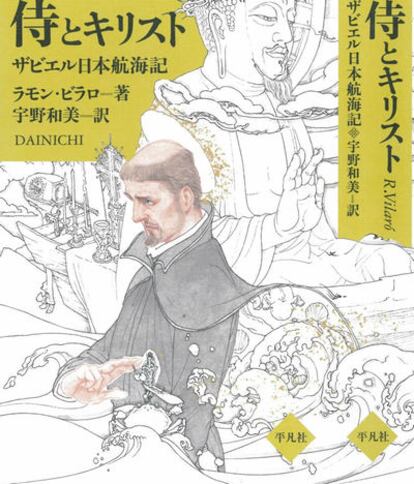Spain's religious legacy in Japan examined in fishy bestseller
Journalists's story of Spanish missionary attracts attention in the Asian nation
A novel by Spanish journalist Ramón Vilaró about one the first Western missionaries to travel to Japan looks set to top the bestseller lists there this autumn.
Even outgoing Prime Minister Naoto Kan was seen last week buying a copy of Dainichi, which tells the story of Francisco Javier, a Catholic priest and one of the founders of the Jesuit order, who arrived in the city of Kagoshima on August 15, 1549. He was the first European to make his entry to the Asian country through the southern port city.
Javier spent more than two years trying to convert the Japaneseto Christianity. The novel begins with his arrival aboard a Chinese pirate ship, exploring first contacts, and Javier's difficult relationship with the religious, civil, and military authorities there, and his eventual meeting with the Emperor. The monks later realized that Javier was preaching a rival religion and grew more aggressive towards his attempts at conversion."Francisco Javier is considered by historians as the beginning of the links between Europe and Japan. I traveled the entire country to research the novel," says Vilaró, a former EL PAÍS correspondent. The author says that Javier not only established the Catholic Church in Japan - there are still around one million Catholics in the country - but also introduced European culinary traditions that remain today, such as tempura, which some experts say is a Japanese variant on the Spanish and Portuguese tradition of deep frying fish.
Ten years after it was written in Spanish, the book has been translated by the Heibonsha publishing house - which has given the book a new title: Samurai and Christ - and been well received by critics and public alike. The book has spawned a documentary co-directed by Vilaró, who is now working on a script for a full-length feature film. "The book is a novel, but it is based on historical facts," says Vilaró, adding during the initial stages of his mission in Japan, Javier was welcomed by the Shingon monks because he used the name Dainichi, the Japanese name for Vairocana, a celestial Buddha, to designate the Christian God.
As Javier learned more about the religious nuances of the word, he substituted the term Deusu, which he derived from the Latin and Portuguese Deus.

Tu suscripción se está usando en otro dispositivo
¿Quieres añadir otro usuario a tu suscripción?
Si continúas leyendo en este dispositivo, no se podrá leer en el otro.
FlechaTu suscripción se está usando en otro dispositivo y solo puedes acceder a EL PAÍS desde un dispositivo a la vez.
Si quieres compartir tu cuenta, cambia tu suscripción a la modalidad Premium, así podrás añadir otro usuario. Cada uno accederá con su propia cuenta de email, lo que os permitirá personalizar vuestra experiencia en EL PAÍS.
¿Tienes una suscripción de empresa? Accede aquí para contratar más cuentas.
En el caso de no saber quién está usando tu cuenta, te recomendamos cambiar tu contraseña aquí.
Si decides continuar compartiendo tu cuenta, este mensaje se mostrará en tu dispositivo y en el de la otra persona que está usando tu cuenta de forma indefinida, afectando a tu experiencia de lectura. Puedes consultar aquí los términos y condiciones de la suscripción digital.








































